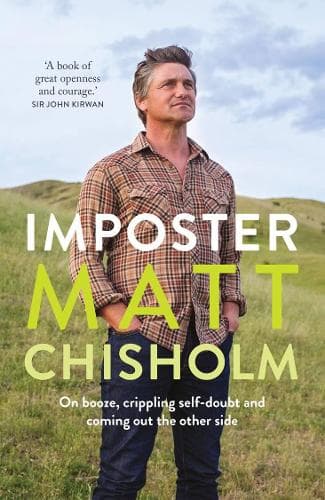Review: Imposter
Reviewed by Greg Fleming
Many will remember Matt Chisholm from his stints on Close Up, Seven Sharp and Sunday and as the garrulous, engaging host of Celebrity Treasure Island and Survivor New Zealand —but his trademark happy-go-lucky exterior hid a man wracked by self-doubt and depression.
Part of the problem was alcohol. Chisholm tried his first drink at 14 - and it would rule his life for the next 20 years. He couldn’t stop at just one or two drinks. After a few beers he felt a need to “finish the job and see where the drinking would take me.”
Much of the first half of the book - pre tv stardom - reads like a Kiwi Boy’s Own adventure: footy, drinking with mates, travelling the world, streaking from pub to pub while at Lincoln University and hooking up with random women. Outwardly he was the typical Southern Man, staunch and always up for a good time, but it was a persona Chisholm didn’t get any joy from.
After an extended OE, he pursued a journalism career and in 2006 completed a Massey journalism course. The trade was in his blood. His uncle was a respected journo and had hosted Sky News in Europe.
Chisholm’s personality-first style had caught the eye of TVNZ and, with veteran journo Mike Valintine in his corner, Chisholm’s career soared. He was soon one of our most recognisable TV journalists and busy living the media high life in Auckland but, in reality, he was burnt out and regularly drinking to blackout. He writes that he was just “one crazy night out on the booze away from stuffing everything up.”
The work environment at TVNZ - circa 2008 - didn’t help. Chisholm isn’t reticent about calling out its toxic work culture. Bullying and favouritism were rife. On Friday nights, he writes, “the newsroom didn’t look too dissimilar to an old booze barn… trolleys of beer, wine and chips would be carted around to every department…”
While he gave up drinking in 2010, Chisholm’s problems were, in some ways, just beginning. He soon cross-addicted and became a workaholic. Every night when he had a story on TV, he would bask in a “drug-like hit” but that soon wore off and the constant stress of finding a new one ruled his waking hours.
Marriage and a growing family helped him find some stability but, even sober, the downward spiral continued. He became paranoid at work, believing his colleagues were “setting him up” and getting preferential treatment; at home he found everyday life as a new father difficult and began to withdraw.
It took the suicide of colleague Greg Boyed before Chisholm finally sought help, posting about it on social media.
Chisholm writes honestly and directly, never excusing the chauvinism of his early years or the missteps he’s taken along the way. It’s a compelling read, by turns inspiring and heartbreaking, and Chisholm is a great raconteur, especially when the going gets grim.
In many ways, he has lived a charmed life; when his parents divorced and he was in danger of failing high school, a family approached his newly divorced mother and took him in. Thanks to his brother being in construction he always had a job waiting. His father, whose tyrannical presence looms over this book, helped him buy him a house in Auckland, and in Elle he met a supportive and loving partner.
Indeed part of the power of Imposter is that it reminds us that depression and addiction can strike anyone and that, no matter how tough things get, there is a way through.
Reviewed by Greg Fleming
